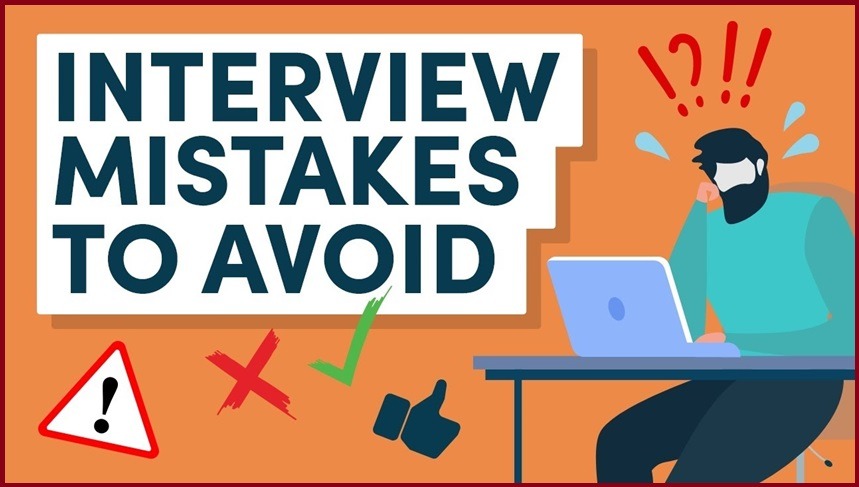You’ve managed to secure an interview for your dream job. This might have taken hours of work, preparing and sending off your resume, completing an application form, perhaps even a telephone screening. The employer has seen something they liked and is giving you the chance to prove your worth for the job, so it’s important that you present your best side. It’s natural to be nervous, and seasoned interviewers will be expecting nerves and might even help you overcome them. What they might not be, is tolerant of some of the most common, and most damaging interview mistakes. Knowing what these are and how to avoid them will help you to sail through those interview questions and show your true potential.

Top 10 Interview Mistakes
1. Not preparing sufficiently.
An ill prepared interviewee is guaranteed to irritate the interviewer. Don’t let them think that you’re wasting their time by asking basic questions about what the company does. Do your homework before you go and at the very least show interest by finding out a bit about the company history, ethos and approach. Ideally, try to get hold of a copy of the job profile for the position you’re interested in- this will help you to seem professional and prepared.
2. Not listening.
Nerves play a part in interviews, and nervous people naturally babble but there’s nothing worse than a candidate who never answers the interview questions asked. If you don’t listen carefully during interview it suggests that you won’t do this once employed. Calm down, take your time and listen carefully- check that you understand a question before you answer it and don’t be afraid to ask for clarification.
3. Dressing inappropriately.
One of the biggest interview mistakes people make is dressing inappropriately for their interview. Remember the old addage ‘people like people like themselves’, and consider this when you’re preparing your interview outfit. Managers and HR professionals usually dress smartly, and so it makes sense for you to do the same. If the role is for a company who take pride in allowing their employees to be relaxed at work then it may be appropriate to leave off the tie, but in all cases your clothes should be clean, ironed, and conservative. Today is not the day to try out the lastest bold print shirt, short skirt or low cut top.
4. Being too modest.
Your interviewer wants to learn about you and your skills. The interview is not the right place to claim that you don’t have any skills, are not much good at anything, and to give credit to others for things that you’ve done. You’d be surprised how many people answer the question, ‘What do you consider to be your main strengths’ with, ‘I’m not sure that I have any strengths as such’.
5. Denying any weaknesses.
Your interviewer knows that no one is perfect, and being able to identify your weaknesses and talk about how you overcome them at work is perhaps one of the most important interview skills you can have. Always present a weakness in a positive light, think about the interview question ‘What weaknesses do you have’ before you get there and you’ll be fine.
6. Not prioritizing the interview.
Your interviewer has taken the time to see you, so it is important that you focus entirely on them for the time that you’re with them. Don’t talk about another appointment or interview you’re rushing off to, and what ever you do, don’t answer your mobile phone.
7. Talking about money.
The money question is an important one, but talking about it too early in the interview, and accompanying it with questions about time off and benefits suggests that you’re only interested in the position for one thing and can really turn interviewers off.
8. Assuming it’s a done deal.
Don’t arrive at the interview thinking that all of the hard work is done and the interview itself is only a formality. Give the interviewer and their interview questions the respect they deserve.
9. Being unenthusiastic.
You’ve applied for a job at this company, so the interviewer will probably be making the assumption that you actually want it. Respond enthusiastically to their questions, and smile! Don’t let your nerves make you seem bored or disinterested.
10. Not having any questions to ask.
Having a couple of questions set aside to ask the interviewer will win you brownie points as it shows you’re interested in the company. Questions about the companies social programme, outside interests, development plans and future changes are all good interview questions to ask the employer and show your commitment to the company and job.
Above all, relax and try to enjoy the interview. Avoiding these top 10 mistakes will give you a good chance of keeping that foot in the door and doing your best. Good Luck.

Delhi Courses Academy is a leading institute offering the best digital marketing course in Delhi, known for its practical training, affordable fees, and industry-focused curriculum. With 15+ certifications, 100% placement assistance, and hands-on projects, it prepares students for real-world challenges.

